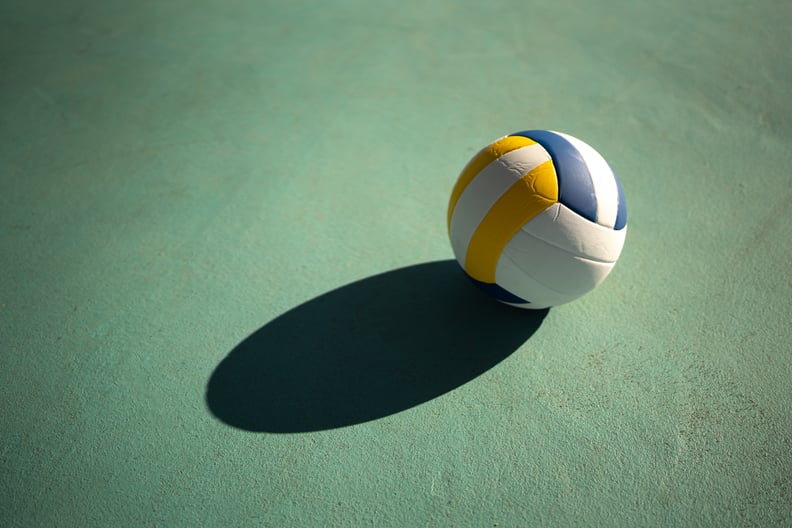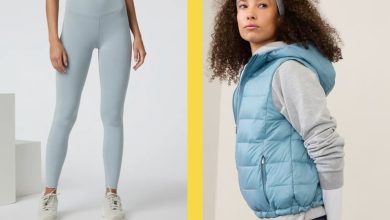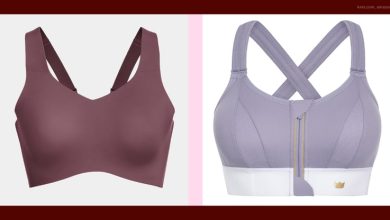The 9 Best Volleyball Shoes, According to Players and Coaches

Some sports are known for their footwear, like basketball, where players’ footwear is as much a fashion statement as it is a tactical choice. Volleyball shoes don’t necessarily get the same hype — but maybe they should.
The right volleyball shoes are crucial for performance and safety, providing support, grip, and traction, all of which are needed during the fast-paced sport. There are specialized volleyball shoes that offer those qualities, many of which are surprisingly trendy. Plus, plenty of players opt for basketball shoes, which deliver the same benefits in a great-looking package.
We asked volleyball players and coaches to share their picks for the best volleyball shoes, including options from brands like Nike, Adidas, and Mizuno. Ahead, see the volleyball shoes that made their list. But first, an expert-backed breakdown of what to look for when choosing a volleyball shoe. some of their favorite picks and top recommended volleyball shoes with PS.
How to Choose The Best Volleyball Shoes
Here’s what coaches had to say. When looking for a volleyball shoe an athlete should consider the following for performance:
- Traction: Volleyball players often make sharp turns and fast starts, so they need something that delivers above-average grip on the court, says Kayla Banwarth, head coach of the Atlanta Vibe, and a bronze Women’s Volleyball medalist from the 2016 Olympic Games. “As volleyball players, we prioritize stability, traction, and ankle support — especially for jumpers. If a shoe can deliver on all three, then it’s a perfect fit for the match,” she adds. Which brings us to:
- Stability: “Volleyball players need a shoe that has stability [and] supports lateral movement, ” says D’Annette Stephens, women’s club volleyball coach for Grand Canyon University. Again, players are moving quickly and often changing directions, so stability is a must.
- Support: “With a lot of jumping you are susceptible to more ankle sprains, and tweaking of things,” says Leah Edmond, an outside hitter with the Atlanta Vibe and the Most Valuable Player of the 2024 Pro Volleyball Federation. Hence: ankle support and overall foot support being key. Some players prefer volleyball sneakers with a higher ankle, while others prefer a low-cut shoe — but either way, the upper and sole must help reinforce the foot during gameplay.
- Comfort and cushioning: Finding a volleyball shoe that is comfortable with cushioning, translates well into physical performance on the court. “Cushioned shoes have soles that absorb impact for jumping and landing,” Stephens says. Fit plays into this, she points out. “Ensure a snug fit with toe room to prevent blisters and injuries,” Stephens says.
- Grip: An equally important quality for volleyball shoes and performance is the amount of grip the shoe has. “Opt for shoes with a sole with an indoor tread for courts,” Stephens says to PS.
The 9 Best Volleyball Shoes
Without further ado, nine volleyball shoes that players say tick off all the boxes listed above.
Nike HyperAce 3 Volleyball Shoes ($125)
This volleyball shoe delivers unmatched traction, comfort, and support, according to its fans.
Expert quote: “I look for shoes that do really good with shock absorption, especially for my position. I’m jumping a ton and having to do a lot of quick cutting movements to get on and off the net and I need something to support me through that,” Leah Edmond of the Atlanta Vibe says of her choice to play in the Nike HyperAce 3. “I also look for something that has great arch support because I have really high arches. I wear insoles as well so I need a shoe that has enough space that it’s not compressing my feet.”
Mizuno Wave Lightning Neo 3 Unisex Volleyball Shoe ($145)
The Mizuno Wave Lightning Neo 3 stands out for its lightweight design and exceptional shock absorption.
Expert quote: “The best overall shoe is probably Mizuno, in my opinion,” says George Padjen, head coach of Indiana’s professional volleyball team, the Indy Ignite. “I think the construction and quality stand up the best.”
Adidas Women’s Crazyflight 5 Low Sneaker ($130, originally $140)
The Adidas CrazyFlight offers exceptional grip and is super lightweight, which comes in handy during jumps; fewer ounces weighing you down makes a difference.
Expert quote: “My favorite volleyball shoe so far is the Adidas Crazyflight Low Volleyball Shoe. I wore them during my season at the University of Kansas and never looked back. They are light, they don’t pinch my heels or Achilles and can fit the large ankle braces I wear,” raves Reagan Cooper, outside hitter for the Omaha Supernovas and 2024 Pro Volleyball Federation Rising Star Award winner.
Adidas Women’s Court Team Bounce 2.0 Indoor ($85)
As you may have guessed from its name, the Adidas Bounce is beloved for its cushioning. It’s a truly comfortable shoe, while still delivering enough stability to keep you safe when making quick pivots and turns.
Expert quote: “I like them because they are light and flexible, which makes them easy to move in. I play outside hitter, so I feel comfortable hitting or passing. They have great traction and stability but also fit my ankle braces,” says Layne Elder, outside hitter for Grand Canyon University Women’s Club Volleyball.
Nike HyperSet 2 Indoor Court Shoes ($135)
This particular Nike shoe came up over and over again during our conversations with players and coaches. It’s lightweight, well-cushioned, and provides excellent ankle support thanks to the higher-cut, midrise upper — so no wonder it’s a favorite.
Expert quotes: “What I enjoy about the HyperSet 2 is they allow jumping to feel very natural without being a really flat shoe,” says Marlie Monserez, a setter for the Atlanta Vibe, who notes that her top sought-after qualities in a shoe are comfort and stability. “It puts forth a volleyball shoes that has the great qualities of a basketball shoe,” like the midrise ankle, “with the added comfort while jumping.” She also calls out the wide toe box as a favorite feature. “Many volleyball shoes are very narrow. This shoe has a toe box that is meant for women with all sized feet,” she says.
“I like that the toe box is a little more spacious than some of the previous ones I’ve worn but not too spacious so I’m not sliding around since and a middle I do a lot of lateral movement and change of direction,” echoes Karis Watson of the Atlanta Vibe, noting that her favorite shoes are supportive on her feet and joints, but also light.
Adidas Women’s Crazyflight Mid Volleyball Shoe ($140)
This iteration of CrazyFlight delivers a midrise upper, with the same cushioning, grip, stability, and light weight of the other versions. It’s great if you’re looking for ankle and foot stability.
Expert quote: “I like these because of the way they fit my feet and the durability they provide overall. I usually look for shoes that have good traction and lightweight material for quick movements while playing. I think these are great for liberos because of the support they give with lateral movements and overall comfort,” says Allison Whitten, libero for the Omaha Supernovas.
Nike Sabrina 1 Unisex Basketball Shoe ($67)
Many volleyball players opt for basketball shoes, which also tend to prioritize stability and support, plus cushioning for jumps. “[Our team has] transitioned to mainly using basketball shoes . . . because they hold up better and provide better support to the athletes,” Padjen confirms. The Nike Sabrina 2s are available in several colorways for $130, but you can find the 1s at a discount if you’re looking to save.
Expert quote: “I wear Sabrina 1s and I like them because they’re lightweight but also supportive. I tend to look for shoes that can handle a lot of wear and tear but aren’t too stiff. I like them to have a little give for knee and ankle safety,” says Kelsie Payne of the Omaha Supernovas. “I really like wearing basketball shoes because they offer a lot of different styles and color variations,” she adds. “They also are good for quick cuts and direction changes. Basketball shoes give really good ankle support while also allowing me to move the ways I want to move.”
Worth noting: many, many volleyball players mentioned loving the Nike Kobe 9s, which are only available on the resale market and will run you north of $200. The Sabrina 1s and 2s aren’t dupes of the Kobes by any means, but they do provide similar grip and support, if that’s what you’re offer.
Nike LeBron Witness 7 ($82-$105)
Another basketball shoe that gets a lot of love from players is the Nike LeBron Witness 7. The name of the game for these sneakers is grip — they have traction that won’t quit.
Expert quote: “Great grip and comfort that allows me to pass and transition as an opposite hitter. They are the only shoes I’ve never slipped in as a hitter,” says Anabel Salcedo, an opposite hitter for Grand Canyon University women’s club volleyball.
Nike Women’s Zoom HyperAce 2 Volleyball Shoes ($90)
The Nike Women’s Zoom HyperAce 2 Volleyball Shoes combine responsive cushioning and lightweight support, making them perfect for athletes seeking comfort and agility on the court. Multiple athletes mentioned how comfortable these Nike volleyball shoes are.
Expert quote: When wearing these sneakers, “I feel strong in my lateral movements, which is really important for me as a libero. I never have to break in the shoe when I’m changing pairs,” says Morgan Hentz, a three-time National Women’s Volleyball Champion and a libero for the Atlanta Vibe. “They are extremely comfortable and help me feel at my best on the court”
When it comes to qualities of a solid volleyball shoe, “I’m looking for a shoe that I essentially don’t notice when I play,” Hentz adds. “Something that doesn’t rub against my ankles, that has good traction on the court, and provides me with a feeling of stability in the movements I make.”
Jade Esmeralda (she/her), MS, CSCS, is a health and fitness staff writer and a strength and conditioning specialist. A lifelong martial artist and dancer, Jade has a strong passion for strength and conditioning, sports science, and human performance. She graduated with a Master of Science degree in exercise science and strength and conditioning from George Washington University.



